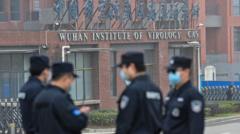Germany's foreign intelligence service, the Bundesnachrichtendienst (BND), reportedly held a belief that there was an 80-90% chance that the coronavirus leaked from a laboratory in China, according to investigations by two German newspapers. These assessments, conducted in 2020, had been kept confidential until now and center around the activities of the Wuhan Institute of Virology, which was purportedly engaged in experiments designed to enhance the transmissibility of certain viruses to humans.
Despite ongoing denials from China, which insists that the origins of Covid-19 should be determined by scientific inquiry rather than political narratives, the lab-leak hypothesis continues to draw significant attention—from intelligence agencies, at least. Recent statements from the CIA indicated that the possibility of the virus stemming from laboratory-related origins might be more plausible than previously acknowledged.
Publications Die Zeit and Sueddeutscher Zeitung reported that the BND's findings were part of Project Saaremaa, commissioned by then-Chancellor Angela Merkel's office and included indications of safety protocol violations at the lab. This information was ultimately shared with the CIA in late 2022.
The WHO previously conducted an investigation, concluding that the lab-leak theory was "extremely unlikely" after spending 12 days in Wuhan. Nonetheless, some scientists have expressed skepticism over the conclusions drawn, suggesting that the lab-leak theory did not receive adequate consideration. The natural origin theory, which posits that the virus jumped from bats to humans through an intermediary species, faced increased scrutiny as no potential animal hosts matching the genetic makeup of Covid-19 have been identified.
As the debate unfolds, China's foreign ministry has reiterated its stance against politically motivated questioning of the pandemic's origins. The complexities surrounding the source of Covid-19 continue to provoke discussion, deeply intertwined with geopolitics and public health responses.


















